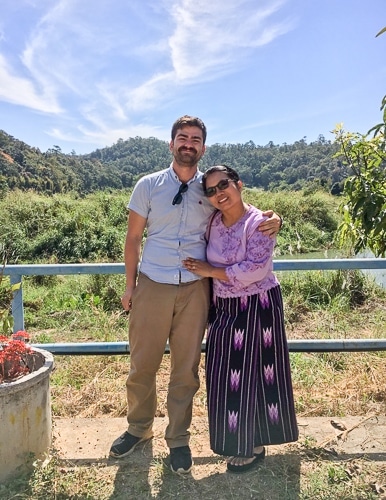Social Action Plan Success Stories: Gage Neiffer
**Note, we changed our name in 2021 to be more reflective of our mission. Institute for Village Studies started in partnership with Western Washington University in 1999, and we look forward to carrying on this work as InPlace - Ecocultural Learning Institute.
The Social Action Plan is a defining factor of a study abroad experience with the Institute For Village Studies. It's an opportunity for a student to utilize what they learned about international development by creating a proposal and implementing a project that is reflective of the larger goals of the communities they visited. Gage Neiffer is an IVS Alumni who traveled on the 2018 Indigenous Knowledge and Sustainability in Thailand Program. For his Social Action Plan, he returned to the Tai Yai village of Ban Tor Pae in Northern Thailand to teach English.
Gage and local Tai Yai community coordinator Pi Liew in Ban Tor Pae
Why did you choose to return and teach English in Ban Tor Pae?
I decided to come back and teach in Ban Tor Pae as it was the best situation for both sides involved. It allowed me to come back and further experience a culture that I had connected with in a country that is bursting with vibrance; from the people, to the food, to the nature. It also gave this community its first long term native English speaking teacher.
How did your relationship with Ban Tor Pae influence the planning of your proposal?
I got to experience two full week as a student with this community through IVS before moving here. In those two weeks, I felt a very real and palpable connection with the people of Tor Pae. There was a lovely woman named Pi Liew who called me Son and I called her Mom. The local leaders of the village took time and energy every day to ensure our comfort and education was up to par. Anytime I walked anywhere I was greeted with smiles, warm hearts, and the gifts of food. This was a community that gave me so much and I wanted to pay it back in folds.
Were there any particular factors that contributed to successfully implementing your Social Action Plan?
The factor that helped with my project's success was first and foremost communication. There is not a large English proficiency in Ban Tor Pae and I have the Thai language skills of a four year old, so being thorough, explicit, and early with communication was paramount in implementing my Social Action Plan successfully.
Have there been any challenges and how have you overcome them?
There honestly haven't been many challenges. I had everything set up before I left the village during my IVS program, so logistically I was set from the get go. There are some everyday challenges like not having the luxury of hot showers or a bug free bedroom, but those pains are a penny on the dollar of pleasure this place gives me.
Do you have any advice you would give to students to create and implement an effective Social Action Plan?
Choose something that is doable. What's doable will vary greatly from person to person. For me, I had previous experience both living in a foreign country and teaching ESL, as well as a few months free to offer. Moving to a Tai Yai village to volunteer was not that big of a stretch. Just try and reach for the best looking fruit that you can realistically grab and take a bite.
Do you have any plans to utilize what you learned creating a Social Action Plan for future projects?
I plan on teaching English as a profession, so this experience will be quite useful in my future endeavors.
Is there anything else you would like to add?
All in all, I have nothing but good things to say about my experience with IVS. It allowed me to experience so many things that would have otherwise been completely off the table; notably this iceberg slow Thai immigration line I'm waiting in while writing this. But once again, a penny of pain on the dollar of joy that the Land of Smiles offers; sounds like a good deal to me.
Want to keep up with Gage’s time in Thailand, follow him on Instagram.












Our decision-making processes throughout the pandemic have been grounded in our values. We have been intentional in our approach to stay true to our mission. This year, we have continued to implement strategies to connect our network through peer-peer learning, hone our model for change and community-driven development, and tackle challenging issues like climate change.